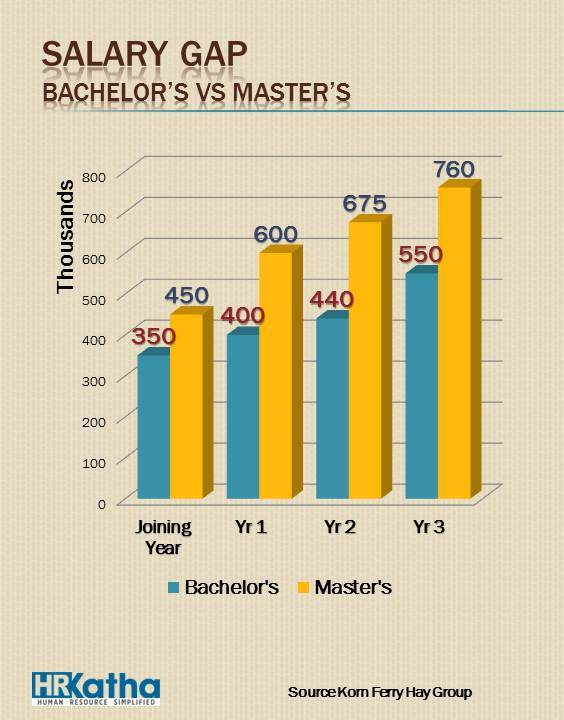While salaries of postgraduates grew by 68 per cent in three years, they increased by only 57 per cent for graduates.
In terms of competencies, there might be very little difference between graduates and postgraduates, but in terms of salaries, there is certainly a gap.
According to the Korn Ferry Hay Group, 54 per cent of the companies have a different remuneration policy for graduates as opposed to their standard pay policy.
The average hiring salary for those holding a bachelor’s degree is Rs 3.50 lakh, whereas people with a master’s degree get an average entry salary of Rs 4.5 lakh.
For bachelor’s degree holders, the salary increases by only 50,000 to Rs 4 lakh. In comparison, master’s degree holders get an increment of Rs 1.5 lakh at the end of the first year.
By the end of the third year, the salary of graduates goes up to Rs 5.5 lakh—an average annual increase of 19 per cent—while for postgraduates, the average annual increase is close to 23 per cent with their salary increasing to Rs 7.6 lakh in the third year.
However, it is to be noted that this figure doesn’t include people from Tier I colleges.
The Korn Ferry Hay group has predicted that the average salary increase across job roles in 2016, will be 10.3 per cent.
If we break down the jobs into four levels — clerical & operational, supervisory & junior professionals, middle management & seasoned professionals, and senior management & executives—then for the middle management and clerical levels, the average salary increase will be 10.5 per cent and 10 per cent, respectively. For senior and supervisory levels, the salaries will be lesser by 0.2–0.3 percentage points.
In terms of sectors, hi-Tech and chemical industries is expected offer the highest increment at above 11 per cent. These two industries are expected to lead the market in terms of pay raises. High tech is the only sector where the increments are expected to be higher, though marginally, compared to last year. For all the other sectors, it is lower in comparison to 2015
In other sectors such as automobile, FMCG, retail and industrial goods, the average increments are expected to be between 10-11 per cent and in sectors such as construction & materials and oil & gas, the salary increase will be in the around 9 per cent.
Value our content... contribute towards our growth. Even a small contribution a month would be of great help for us.
Since eight years, we have been serving the industry through daily news and stories. Our content is free for all and we plan to keep it that way.
Support HRKatha. Pay Here (All it takes is a minute)




































